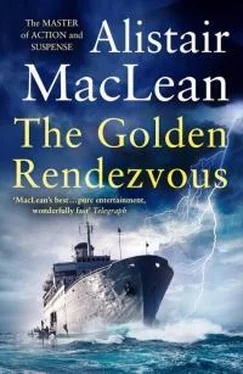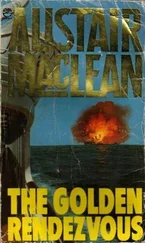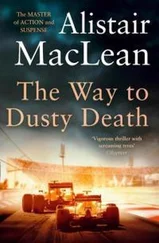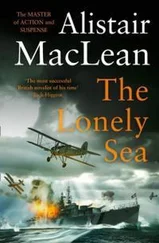The cold driving rain was falling even more heavily than ever now, slanting in across the port side, drumming metallically against the accommodation bulkheads, rebounding ankle-high off the polished wooden decks. On the likely enough theory that Carreras’s patrolling men would keep to the sheltered starboard side of the accommodation, I kept to the opposite side as I hurried aft: in my stocking soles and wearing that black suit and mask, no one could have heard or seen me at a distance of more than a few feet. No one heard or saw me, I heard or saw no one. I made no attempt to look, listen or exercise any caution at all. I reached number four hold within two minutes of leaving Carreras’s cabin.
I needn’t have hurried. Carreras had made no attempt to replace the tarpaulin he’d had to pull back in order to remove the battens, and I could see straight down into the bottom of the hold. Four men down there, two holding powerful electric lanterns, Carreras with a gun in the hand hanging by his side, the lanky, stooped form of Dr. Slingsby Caroline, still wearing that ridiculous white wig askew on his head, bent over the Twister. I couldn’t see what he was doing.
It was like a nineteenth-century print of grave-robbers at work? The tomb-like depths of the hold, the coffins, the lanterns, the feeling of apprehension and hurry and absorbed concentration that lent an evilly conspiratorial air to the scene – all the elements were there. And especially the element of tension, an electric tension that you could almost feel pulsating through the darkness of the night. But a tension that came not from the fear of discovery but from the possibility that at any second something might go finally and cataclysmically wrong. If it took ten minutes to arm the Twister, and obviously it took even longer than that, then it must be a very tricky and complicated procedure altogether. Dr. Caroline’s mind, it was a fair guess, would be in no fit state to cope with tricky and complicated procedures: he’d be nervous, probably badly scared, his hands would be unsteady, he was working, probably with inadequate tools, on an unstable platform by the light of unsteady torches and even though he might not be desperate enough or fool enough to jinx it deliberately there seemed to me, as there obviously seemed to the men down in the hold, that there was an excellent chance that his hand would slip. Instinctively, I moved back a couple of feet until the coaming of the hatch came between me and the scene below. I couldn’t see the Twister any more so that made me quite safe if it blew up.
I rose to my feet and made a couple of cautious circuits of the hatch, the first close in, the second farther out. But Carreras had no prowlers there: apart from the guards on the gun, the after-deck appeared to be completely deserted. I returned to the port for’ard corner of the hatch and settled down to wait.
I hoped I wouldn’t have to wait too long. The sea-water had been cold, that heavy rain was cold, the wind was cold, I was soaked to the skin and was recurringly and increasingly subject to violent bouts of shivering, shivering I could do nothing to control. The fever ran fiercely in my blood. Maybe the thought of Dr. Caroline’s hand slipping had something to do with the shivering: whatever the reason, I’d be lucky to get off with no more than pneumonia.
Another five minutes, and I took a second cautious peek down into the hold. Still at it. I rose, stretched and began to pace softly up and down to ward off the stiffness and cramp that was settling down on my body, especially on the legs. If things went the way I hoped I couldn’t afford to have stiffness anywhere.
If things went the way I hoped. I peered down a third time into the hold and this time stayed in that stooped position, unmoving. Dr. Caroline had finished. Under the watchful eye and gun of the radio operator, he was screwing the brass-topped lid back on to the coffin while Carreras and the other man had the lid already off the next coffin and were bent over it. Presumably fusing the conventional explosive inside: probably it was intended as a stand-by in case of the malfunction of the Twister, or even more probably, in the event of the failure of the Twister’s timing mechanism, it was designed to set it off by sympathetic detonation. I didn’t know, I couldn’t guess. And, for the moment, I was not in the slightest worried. The crucial moment had come.
The crucial moment for Dr. Caroline. I knew – as he was bound to know – that they couldn’t afford to let him live. He’d done all they required of him. He was of no further use to them. He could die any moment now. If they chose to put a gun to his head and murder him where he stood, there was nothing in the world I could do about it, nothing I would even try to do about it. I would just have to stand there silently, without movement or protest, and watch him die. For if I let Dr. Caroline die without making any move to save him, then only he would die: but if I tried to save him and failed – and with only a knife and marline-spike against two sub-machine-guns and pistols the chances of failure were a hundred per cent – then not only Caroline but every member of the passengers and crew of the Campari would die also. The greatest good of the greatest number … Would they shoot him where he stood or would they do it on the upper deck?
Logic said they would do it on the upper deck. Carreras would be using the Campari for a few days yet, he wouldn’t be wanting a dead man lying in the hold and there would be no point in shooting him down there and then carrying him up above when he could make the climb under his own steam and be disposed of on the upper deck. If I were Carreras, that is what I would have figured.
And that was how he did figure. Caroline tightened the last screw, laid down the screwdriver and straightened. I caught a glimpse of his face, white, strained, one eye twitching uncontrollably. The radio operator said: “Señor Carreras?”
Carreras straightened, turned, looked at him, then at Caroline and nodded.
“Take him to his cabin, Carlos. Report here afterwards.”
I moved back swiftly as a torch shone vertically upwards from the hold. Carlos was already climbing the ladder. “Report here afterwards.” God, I’d never thought of so obvious a possibility! For a moment I panicked, hands clenched on my pitiful weapons, irresolute, paralysed in thought and action. Without any justification whatsoever I’d had the picture firmly in my mind of being able to dispose of Caroline’s appointed executioner without arousing suspicion. Had Carlos, the radio operator, been under instructions to knock off the unsuspecting Caroline on the way for’ard then carry on himself to his wireless office, then I might have disposed of him and hours might have passed before Carreras got suspicious. But now what he was, in effect, saying was: “Take him up top, shove him over the side and come back and tell me as soon as you have done so.”
I could see the heavy rain slanting whitely through the wavering torch beam as Carlos climbed swiftly up the ladder. By the time he reached the top I was round the other side of the hatch coaming, lying flat on the deck.
Cautiously, I hitched an eye over the top of the coaming. Carlos was standing upright on the deck now, his torch shining downwards into the hold. I saw Dr. Caroline’s white head appear, saw Carlos move back a couple of steps and then Caroline, too, was over the top, a tall hunched figure pulling high his collar against the cold lash of the rain. I heard, but failed to understand, a quick sharp command and then they were moving off diagonally, Caroline leading, Carlos with his torch on him from behind, in the direction of the companion-way leading up to “B” deck.
I rose to my feet, remained immobile. Was Carlos taking him back to his cabin after all? Had I been mistaken? Could it be – –
Читать дальше
Конец ознакомительного отрывка
Купить книгу












